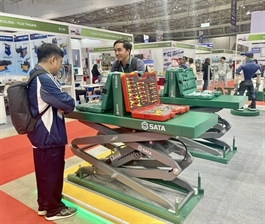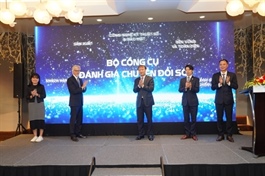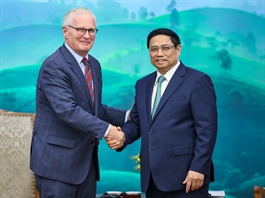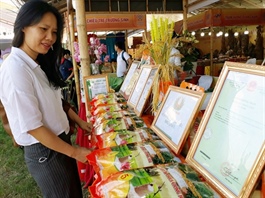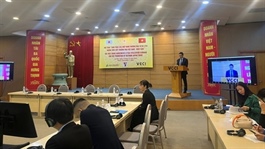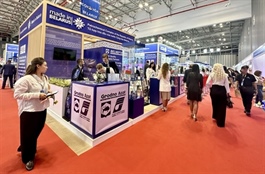Legal clarity will help Vietnam unlock offshore wind power potential: Danish ambassador
Legal clarity will help Vietnam unlock offshore wind power potential: Danish ambassador
Danish Ambassador to Vietnam Nicolai Prytz has shared his appreciation for the drastic steps Vietnam has taken to implement its commitment to net-zero emissions. However, according to Prytz, Vietnam needs a clear legal framework as well as significant public investment in order to continue this work.
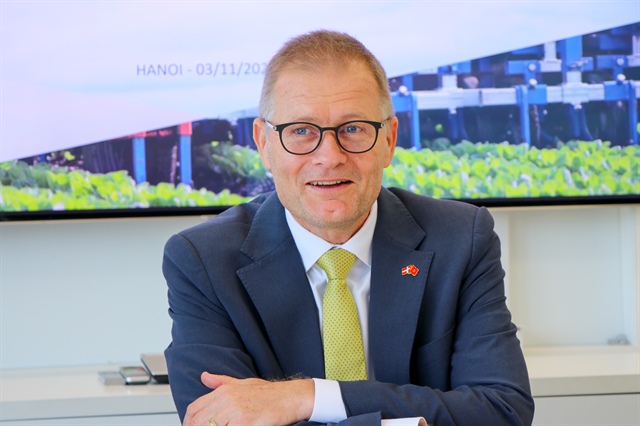
Danish Ambassador to Vietnam Nicolai Prytz |
On the sidelines of the ongoing 28th United Nations Climate Change Conference of the Parties (COP28) in the United Arab Emirates (UAE), Vietnamese Prime Minister Pham Minh Chinh met with Danish Prime Minister Mette Frederiksen to discuss the Southeast Asian country’s efforts to reach net-zero emissions.
The meeting took place not long after the two countries established a green strategic partnership on November 1.
To discuss the partnership, Tuoi Tre News spoke with Danish Ambassador to Vietnam Pyrtz regarding measures Vietnam can take to accelerate its green transition and attract related investment.
At COP28, Prime Minister Chinh announced the Resource Mobilization Plan for the Just Energy Transition Partnership (JETP), making Vietnam the first developing country in the JETP to make such an announcement. Can you comment on PM Chinh’s pronouncement and share the specifics of what Denmark and European countries have planned in respect of this initiative?
I want to commend Vietnam for launching a Resource Mobilization Plan (RMP) just one year after its political agreement with the JETP. This is an important first step in the implementation of the JETP as it includes an assessment of prioritized investments. It also recognizes the need to create an enabling environment that can attract the vast amount of private investment that is needed for its green transition, including a proper regulatory framework. This is very much the focus of the Danish-Vietnamese Energy Partnership Program.
Moreover, the Danish Embassy serves as a bridge to potential Danish investors in Vietnam’s green transition.
How do you evaluate Vietnam's process of implementing commitments in the Paris Agreement and COP26?
With 50 percent of its electricity coming from renewable sources and 20 GW of solar and wind power installed in just a few years, Vietnam is a [green energy] leader in Southeast Asia.
This has not gone unnoticed and has attracted new FDI projects looking for renewable energy to power their facilities.
Moreover, Vietnam has adapted some very important targets in the last couple of years, one of these being its commitment at COP26 – net-zero emissions by 2050 – and, subsequently, becoming party to the JETP with the International Partnership Group that consists of the G7 countries, the European Union, Denmark, and Norway. In that regard, I would like to congratulate the government of Vietnam on the launch of its RMP at COP28. Vietnam has also approved Power Development Plan 8, which clearly prioritizes renewable energy as the source of energy to power Vietnam’s future growth.
In other words, a series of bold commitments have been made. The challenge now is to convert the commitments into implementation plans and legal frameworks. This is a challenging process, but there is no other way.
Developing countries like Vietnam need a lot of resources to implement climate commitments and withstand consequences that are largely not caused by them. The role of developed countries is therefore very important. Did Denmark make any commitments during COP28 regarding financial support for developing countries which need to adapt to climate change? What support will Vietnam receive from Denmark in particular and developed countries in general?
Denmark might be a relatively rich country, but in many ways, we are siding with developing nations.
In connection with COP26, Denmark committed US$1 billion of financing to climate adaptation and green transition, which is equivalent to one percent of the $100 billion pledge made by developed countries – much beyond our natural share. Subsequently, at COP28, our prime minister announced a total of $50 million in support to the most climate-vulnerable countries – half of it going to the new loss and damage fund. Together with international partner countries, Denmark has launched two initiatives aimed at de-risking private investments in green solutions in developing countries. Government funding cannot alone carry the investments required globally, but we believe that such government funding can play a key role in mobilizing more private capital by carrying more of the risk.
Regarding Vietnam, we will continue our longstanding and close cooperation with the Ministry of Industry and Trade in the Danish-Vietnamese Energy Partnership Program, which started in 2013. We focus on long-term planning of the energy system, efficient integration of wind and solar energy into the national electricity system, and improving energy efficiency in the industrial sector.
Our two prime ministers launched our bilateral green strategic partnership on the first of November this year. This new framework will enable us to further strengthen our already close and fruitful cooperation on energy transition and other important areas of the green transition and climate change issues.
Finally, Denmark is also partnering with Vietnam through the mentioned JETP and we hope this will help with accelerating the decarbonization of the economy while also addressing social consequences.
Danish businesses are particularly interested in the field of offshore wind power in Vietnam. However, recently group, Orsted, has withdrawn. In your opinion, is it because of problems on the Vietnamese side? What does Vietnam need to do to attract more private investors in offshore wind power, like Denmark?
To my knowledge, Orsted regards Vietnam as an important sourcing market. Just this year, very large contracts were signed with PetroVietnam Technical Services Corp (PTSC) to build offshore wind farm foundations and offshore substations. PTSC is now the first Vietnamese business to receive a mass order for offshore wind power components.
However, it is true that Orsted recently announced that they won’t be pursuing any offshore wind development projects in Vietnam, but I believe that is mainly a business decision. In other words, rather than deselecting Vietnam, it is more a matter of pursuing business opportunities in other markets that for now simply appear more immediate and mature.
Nevertheless, it does underline the need for Vietnam to develop an attractive regulatory framework for the offshore wind sector. If that is not provided soon, Vietnam could risk investors pursuing other market opportunities. I, therefore, believe that Vietnam has a strong incentive to keep pushing forward on developing an offshore wind energy sector. With a proper regulatory framework in place, I have no doubt that Vietnam could become a regional hub for offshore wind energy generation and play a crucial role in the regional supply chain for these kinds of projects. It would bring along massive private sector investments in both local production and re- and upskilling of labor.
One of the topics of concern at COP28 is ending the exploitation of new oil fields. In your opinion, will this agreement be reached when the world economy is still heavily dependent on fossil fuels? From Denmark's experience, how can the dependence on fossil fuels be reduced while still ensuring economic development and limiting negative socio-economic impacts?
The reality is that we are not on track when it comes to the Paris Agreement. We need to move much faster. Therefore, Denmark believes that it is crucial that the ultimate goal is to, over time, phase out fossil fuels. Simultaneously, we need to scale up renewable energy and energy efficiency.
The Danish energy transition started in the 1970s with the oil crisis, when we realized that we were too dependent on fossil fuels. Visionary political decisions have led us to invest massively in renewable energy and energy-efficient technologies, through public-private partnerships and in broad consultations with civil society. We have, since then, grown our economy steadily while reducing our total energy consumption by more than 10 percent and emissions by over 40 percent -- so decoupling is possible.








